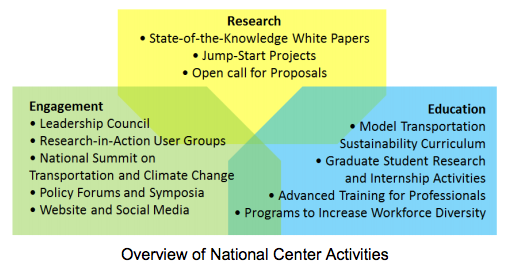NCST
Stop the VideoNCST


The National Center for Sustainable Transportation (NCST) provides national leadership in advancing environmentally sustainable transportation through cutting-edge research, direct policy engagement, and education of our future leaders. The Institute of Transportation Studies at the University of California, Davis (ITS-Davis) leads the NCST in partnership with METRANS (University of Southern California; Long Beach State University); the University of California, Riverside; Georgia Institute of Technology; and the University of Vermont.
The NCST was established in 2013 after being selected in a national competition to serve as one of five national transportation centers as part of the University Transportation Centers (UTC) program administered by the U.S. Department of Transportation. In 2016, the NCST successfully re-competed for the opportunity to continue serving as one of the U.S. DOT’s five National UTCs and is addressing the Fixing America’s Surface Transportation (FAST) Act research priority area of Preserving the Environment. To preserve the environment, we must minimize the impact of the transportation system on our natural resources, including energy, climate, air, water and land. Although considerable progress has been made in the last five decades, the environmental impacts of transportation remain substantial and fall disproportionately on the most vulnerable members of our communities. The challenge for the nation is to reduce these impacts while meeting the mobility needs of society, fostering healthy communities, and supporting economic growth. In response to this challenge, the NCST’s research, education, and engagement programs are organized around the following high-priority themes:
- Environmentally responsible infrastructure and operations
- Multimodal travel and sustainable land use
- Zero-emission vehicle and fuel technologies
- Institutional change
The NCST receives funding from the U.S. DOT, the California Department of Transportation, the California Air Resources Board, the California Energy Commission, the South Coast Air Quality Management District, the Volvo Research and Educational Foundation, and sources in the States of Georgia and Vermont.


















